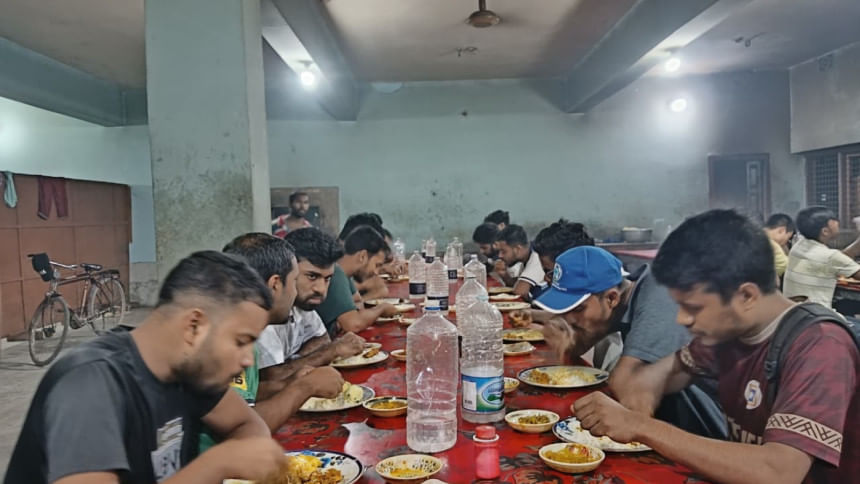RU students still face poor food, housing woes

Following the July uprising, Rajshahi University (RU) authorities had promised sweeping reforms in hall management, particularly in dining services and seat allocation.
However, many students feel that little has changed since then. They said while some transparency has been introduced in hall seat allocation, food quality remains poor, and the persistent accommodation crisis continues to frustrate thousands.
A chronic shortage of seats
RU has around 32,000 students but its 17 residential halls can house only about 10,000. This means nearly two-thirds of the students live outside campus. Since the uprising, no new dormitory projects have been initiated while two halls, which were under construction from the previous administration, have been completed.
Officials claim that seat allocation is now entirely merit-based. However, several students allege that political influence still affects some cases.
Tisa Khatun, a third-year botany student living in July 36 Hall (Bangamata Fazilatunnesa Hall), has spent more than a year in the hall's overcrowded Gono Room.
"There is no ventilation, no personal space, and I have been sharing a bed with another student for more than a year," she said.
Others, however, note some improvement. Saida Akhter, a resident of Khaleda Zia Hall, said, "Although the lack of residential facilities creates problems, the process of seat allocation has become fairer since August 5. Seats are now given accordingly and in a transparent way."
Shariful Islam, a resident of Amir Ali Hall, also praised the "end of seat trading" and the inclusion of poor students in the allocation process.
An RU professor, requesting anonymity, alleged that some teachers run private boarding houses in nearby areas such as Kajla, Binodpur, and Meherchondi. "If the university becomes fully residential, it will hurt their business. That's why genuine initiatives for full residential accommodation are rare," the professor claimed.
Prof Zamirul Islam, convener of the provost council, rejected the allegations. He said since August 5, all seats have been allocated through a transparent, score-based system with quotas properly applied.
Dining
If seat allocation shows mixed progress, dining remains the most glaring problem. Students complain that food quality has not improved despite repeated promises.
In some halls, dining services have been outsourced to private caterers in addition to canteen facilities, but residents insist the meals are unhygienic, monotonous, and lack nutrition. Female dormitories are particularly affected as they have no canteen, forcing students to depend entirely on hall dining.
"There were temporary improvements in food standards when the provost directly supervised the dining, but they lasted only a few days. Potatoes are in every dish, three times a day. The food is the same every day, and even hall shops don't stock basic items," said Asheka Jaima of Khaleda Zia Hall.
Dining managers point to soaring prices as a major obstacle. "A week ago, daily groceries cost Tk 8,000 to Tk 10,000. Now the same items cost Tk 10,000 to Tk 15,000. But meal rates are fixed at Tk 30 for lunch and Tk 22 for dinner. There are no subsidies, so it is very hard to maintain quality," said Shopon Ali, dining manager of Sher-e-Bangla Hall.
Private eateries near RU also reveal how campus politics once dictated student life. Manik Hossain Babu, who runs a hotel near Ziaur Rahman Hall, said, "During the Awami League period, Chhatra League leaders ate at my hotel without paying. Around Tk 8.5 lakh is still due. I even filed a case. But now, the situation is different. Students pay their bills regularly."
Prof Zamirul admitted that dining was "not excellent" but claimed it has improved compared to earlier years. He said the university provides indirect support through subsidies on electricity and infrastructure. He also blamed past irregularities on politically backed students who ate for free -- a practice he claimed has "almost disappeared".

 For all latest news, follow The Daily Star's Google News channel.
For all latest news, follow The Daily Star's Google News channel. 



Comments